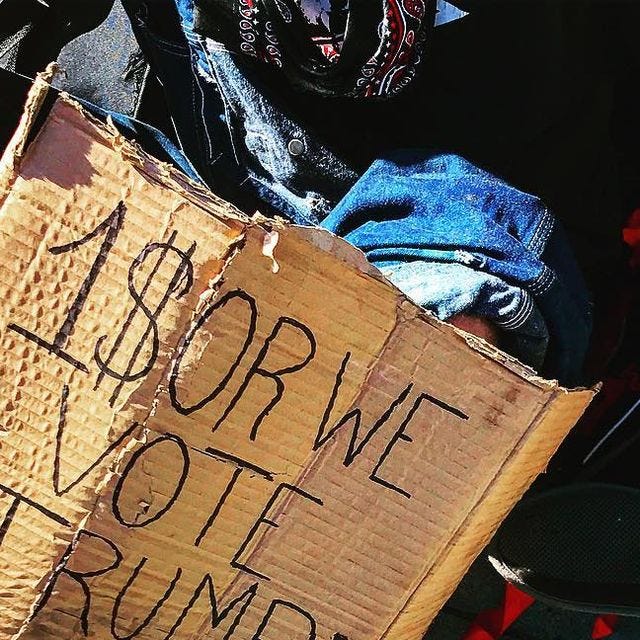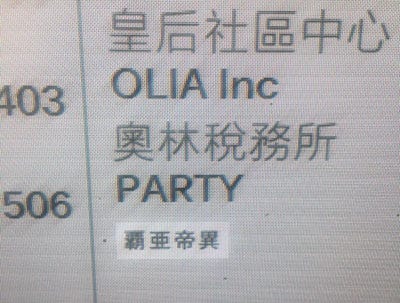I've been meaning to write about a very unusual incident that happened, but when asked if this event led me to any reflections or realizations, the answer is not really. Even as I write this, my thoughts are not particularly organized.
Perhaps even after reading this to the end, all that will remain for the reader is the understanding that I, the writer, got caught up in a very unusual event. Nothing more.
However, as the incident was so unusual, I thought I should document it while the memory is still fresh.
I live in New York, America as a Japanese, and given the times, I receive real-time news not only from my local area in America but also from Japan. Therefore, I hear about everything that happens in Japan, be it the emblem issue, someone's affair, the soil problems in Toyosu, news like Kisenosato got completely defeated today, or even gossips such as Kotoshogiku's wife is sexy and cute.
Meanwhile, in America, the presidential election is almost the only topic of conversation. After all, there's just one week left to the election as I write this. If I walk down the street, I see homeless people holding signs like "Give me a dollar, or I'll vote for Trump!" to earn some spare change, and there are many graffiti related to the election as well.
However, even amidst the presidential election fever, other topics may capture attention or even cause a firestorm on the internet. The concept of "going viral" in a bad way, or "flaming," is not alien to American social media. However, the nature of such 'flames' in the U.S. feels quite different from those in Japan. The most significant difference is in its 'simplicity.'
As mentioned earlier, America is a country of diverse backgrounds, and people hold various interests and perspectives. Therefore, topics like someone's affair or the emblem issue, where multiple opinions might clash, may spark a debate but are less likely to result in a one-sided pile-on (at least, that's my impression. It could be because I'm not involved in such clusters). In Japan, if you voice a slightly positive opinion towards the target of criticism, you'd be treated as a supporter and also get bashed. However, in America, it seems more acceptable for different people to voice different opinions on the same issue.
Yet occasionally, there comes a clear-cut, universally acknowledged 'evil' that everyone agrees is 'out of line.' This transgresses the boundaries of race and religion, and everyone piles on to criticize it. That is the impression I get from the American style of 'flaming.' A recent example would be the case where an American dentist hobby hunting killed Cecil, a lion that was a mascot of Zimbabwe. That situation went viral, and it was straightforward. In the world of 2016, there would be few people who would endorse that kind of hunting. The dentist's actions, among other things, represented an easily identifiable 'evil.' Hence, he faced backlash from everyone. The Yelp page of his dental clinic in Minnesota was full of terrible comments. Things like "This bastard should go back to Africa and get eaten by a lion!"
Donald Trump might be the most straightforward symbol of 'evil,' perhaps the epitome of the American-style flaming method. As reported even in Japan, he consistently makes outrageous comments, attracting massive attention (albeit in a negative sense), prompting numerous people to react and criticize him heavily. This, in turn, dramatically increases his exposure and amplifies his presence. He has gained considerable popularity as someone who voices the 'evil' thoughts that everyone is slightly thinking but can't express because it's unequivocally 'wrong.' Such an obvious 'evil' is rare.
By the way, just like Japan has left-wing media like Asahi Shimbun and right-wing media like Sankei Shimbun, America also has media factions supporting Hillary Clinton and Donald Trump. Actually, it's more straightforward as they openly state something like, "We support XX!" For instance, The New York Times, which is quite familiar to Japanese people, officially announced at the end of September, "We support Hillary!"
On the other hand, FOX News is famous as the staunchest media supporter of the Republican party, or rather Trump. Due to its hardline conservative reporting stance, it is criticized in works like Michael Moore's "Fahrenheit 911" as being a 'private television station for Bush.' As I'm in New York, surrounded by Democratic supporters, quite a lot of people say, "I don't watch FOX!"
Sorry for the long preface, but around October 3rd, shortly after the first of the three presidential debates, a video broadcast during a segment of FOX News' flagship news program sparked controversy and ignited a massive uproar across the United States. Given it caused a nationwide uproar, it's a straightforward case of 'evil.' This week, everyone on social media was fuming about this video, and other TV stations seized the opportunity to lambast FOX News. Had I seen this in passing, I would've undoubtedly thought, 'This is terrible,' and felt angry.
However, in reality, 'This is terrible' was an understatement. The reason being that, for some reason, I found myself appearing quite prominently midway through this controversial video, in such a way as to become the center of the ensuing debate.
So, please watch this controversial video. The man wearing a gray hat and glasses who appears around the 2:45 mark is me.
As seen in the video, I casually perform a karate punch when asked by the reporter, and this footage became a significant issue. This footage was broadcast in the popular segment "Watter’s World" in FOX News' flagship news program "The O'Reilly Factor". The concept of the segment was to ask Chinese people in Chinatown what they think about Trump. However, the interviewer's attitude and editing made the content less about Trump and more about ridiculing 'foolish Chinese people' who have a poor grasp of English, treating them almost like animals. This is unmistakably racial discrimination, a clear 'evil' that unsurprisingly ignited outrage.
Additionally, it became a topic of discussion that the content showed no respect or understanding for Chinese culture. As you may have thought when watching my part of the video, comments flooded the YouTube video pointing out that "Karate isn't Chinese, it's Japanese!" And for some reason, in this debate about "Karate isn't Chinese, it's Japanese!" I, who am not Chinese but Japanese, ended up as the subject of this nonsensical situation.
At the time, my office (PARTY NY) was located in New York's Chinatown, which was the setting of this video. Just until recently, I was working on the new Ghostbusters movie, and their office was depicted as an abandoned restaurant in Chinatown, which I thought was quite an accurate depiction. New York's Chinatown is not as fashionable as Yokohama's Chinatown in Japan. It's quite gritty and organic overall, with many slightly dilapidated shuttle buses departing for Atlantic City (a casino city often referred to as the "Las Vegas of the East Coast", about 2.5 hours from NY). Thanks to the lower rent, just like the Ghostbusters, we had our office in a corner of Chinatown. We recently moved from the area, but until then, we were actually renting a room above an abandoned Chinese restaurant.
That day, I stepped out of the office with the intention of eating Taiwanese fried chicken from a Taiwanese cafe chain next to our office building for lunch. However, this Taiwanese cafe didn't accept credit cards, so I needed to withdraw some cash. I was heading to the nearest Chase bank to do that when I was caught by this interviewer right in front of the bank. It was right near Joe’s Shanghai, which is famous for its soup dumplings.
He approached me out of the blue and asked, "Excuse me, as a Chinese person, what do you think about Mr. Trump?" But well, since I'm not Chinese, I responded something like, "Sorry, I'm Japanese, so I can't answer your question."
Then he asked me, "Why is a Japanese person in Chinatown?!" Although I thought there's nothing wrong with it, the next question he asked was quite harsh: "Do Japanese people look down on Chinese people?" In my case, I don't have such feelings, so I responded something like, "Eh?! Well, there are differences, but I don't think we look down on them." While saying this, I started to sense some kind of bias in this interview and tried to get away from him.
He persistently asked in a way suggesting that I was indeed looking down on them: "Come on, you're kinda looking down on them, aren't you?" I was wondering what he was trying to make me say...
And when I really tried to get away from him, he said, "Just one more question, please!" That's when he asked the question that made it on air: "Do you know Karate?" I have been going to a karate dojo in Columbus Circle with my child for about a year, learning karate from Igor Sensei, a former Ukrainian karate representative (super strong), so I am quite familiar with karate. When he asked me to show a punch, I did, and that's how I ended up being used in such a way.
The truth is, the folks at FOX News were well aware that I was Japanese and that Karate isn't Chinese, but there's no doubt that at the stage of the street interview, they had an atmosphere of making fun of Asians, whatever the case may be.
Immediately after it was aired, this footage began to go viral, and I was notified by my friend Linn, who messaged me saying "You're in it!" and that's how I found out it was becoming a topic of conversation. It seems there was a fuss at StinkDigital, where she works, with people exclaiming "Qanta is on FOX!"
When it's such a clear-cut case of "evil," the fire spreads rapidly. Other TV stations also began to report on this news. Among them, the one that caused a stir was this one aired by Comedy Central, a comedy-focused channel.
They strongly criticized the original FOX News, using a lot of four-letter words, and conducted new interviews with "Chinese as humans" in Chinatown (I later spoke with this person in a phone interview). This footage, too, spread quite a bit. I also appear quite prominently in it, and since quite a few people were watching it, around this time, I started getting lots of messages from friends I hadn't seen in a while and business partners, saying things like, "Hey, long time no see! Weren't you doing Karate on FOX News?" I was also recognized on the street a couple of times, with people asking, "Are you the Karate guy?" While all this was happening, politicians began to comment on the footage, and it became more and more of a big deal. Actually, it even made the news in Japan, including on CNN's Japanese version.
I myself, upon finding out that I was in this footage, thought "Oh no, what's this?" But soon, I decided to complain in a comment on the interviewer's Facebook post. Perhaps I was the only one among those who appeared in the footage who did something like that, because soon after, I started getting interview requests from other TV stations and media. Interview teams came to our office to get my comments, I appeared live on morning news shows via Skype, and gradually I started to feel like a person in the spotlight. I talked about things unrelated to the FOX footage, such as Brexit, what I think of Trump as a Japanese person, and so on.
Chinatown Responds as Fox Reporter Defends 'Tongue-In-Cheek' Segment
Anyway, I am a person who has lived in a world almost devoid of racial discrimination (Japan) for 37 years, so my thoughts may be shallow, and suddenly being involved in such a situation, I don't have much to say or think about at this point.
I'm sure things will come up eventually, such as what I thought about the United States through such events, or what I thought about Japan, my homeland, in contrast, but for now, it's just a very unusual experience that has just passed, so I thought I'd record it while the memories are fresh.
But if I force myself to write down a little bit of what I thought, there was a place where I was actually a little relieved to be in the swirl of anger surrounding this incident. The journalists who interviewed me were all furious and voicing their protests. They were many times more angry than I, the person involved. There were a lot of people of Asian descent too. They were genuinely angry for their rights, their existence, and such. Those who are angry at Trump also have a clear reason for their anger. It's natural for women to be angry, and it's natural for racial minorities to be angry. If the target of the flame war is easy to understand, the reason for the anger is easy to understand and natural, I think.
On the other hand, the "flame wars" that occasionally occur in my homeland of Japan, when viewed from the outside, seem difficult to understand who is angry for what reason, or appear to be angry for the sake of being angry, including those who fan the flames. When people get angry at a celebrity who has had an affair, it feels like they are trying to protect something of their own. It seems like everyone is originally irritated and angry at something abstract, and when a target that they are "allowed to be angry at" appears, everyone goes to hit it all at once. It's hard to understand. I always feel foggy about that.
So, being involved in a big flame war in America for the first time, I feel like something of this level will not happen to me, but as a person who has seen both American and Japanese flame wars, I was a little relieved that it was so easy to understand. Of course, there is nothing we can do about this kind of racial discrimination.





